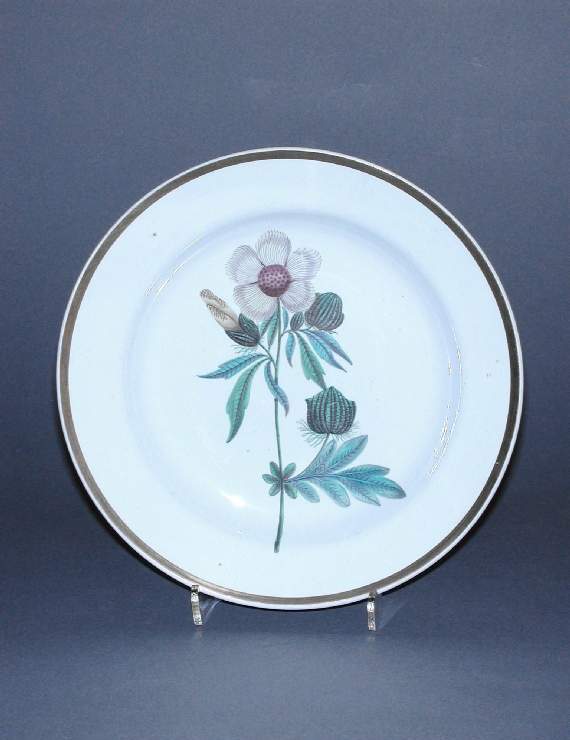Current Location: In storage
Maker(s)
Production:
Leeds Pottery
Entities
Categories
Description
George III
Pearlware dessert plate, painted in polychrome and gold with a Bladder Hibiscus.
Pearlware painted in green, yellow, pale purple, dark pink and grey enamel-colours, and gilt. Circular with a sloping rim and deep well, standing on a slight footring, beside which the bluishness of the lead glaze can be seen. On the front there are three small spur marks and on the back, three groups of three spur marks. The front is decorated in the well with a stem of bladder hibiscus with an open flower, a partly opened bud and two buds; and round the rim with a broad gilt band. The base is inscribed in red enamel 'Bladder Hibiscus'.
Notes
History note: Messrs A.F. Allbrook, London, from whom purchased in March, 1973 by Sir Ivor Batchelor; Sir Ivor and Lady Batchelor
Legal notes
Given by Sir Ivor and Lady Batchelor
Measurements and weight
Diameter: 21 cm
Height: 2.8 cm
Place(s) associated
Acquisition and important dates
Method of acquisition: Given
(1997-01-20)
by
Batchelor, Ivor, Sir and Lady
Dating
19th Century, Early
Circa
1800
CE
-
1815
CE
Note
Botanical flower decoration was fashionable on dessert services in the early 19th century when there was widespread interest in botany and horticulture. The bladder hibiscus (hibiscus trionum) was copied from plate 209 in 'The Botanical Magazine; or Flower-Garden Displayed', vol. V, 1792. The plant is a member of the mallow family, Malvaceae, and is also known as 'flower of an hour', because its flowers are very short-lived. It has bladder-like seed capsules, hence the name which appears on the back of the plate. The ceramic collection at Temple Newsam House, Leeds, includes nine Leeds dessert plates, decorated in a similar way with a single plant, whose name is written on the back.
School or Style
botanical
Components of the work
Decoration
composed of
enamels
( in green, yellow, pale purple, dark pink and grey)
gold
Materials used in production
Lead-glaze
Earthenware
Techniques used in production
Moulding
: Pearlware painted in green, yellow, pale purple, dark pink and grey enamel-colours, and gilt.
Lead-glazing
Inscription or legends present
Inscription present: only the upper part of the letters and asterisk are visible
- Text: LEEDS * POTTERY
- Method of creation: Impressed in slight curve
- Type: Factory mark
- Text: Bladder Hibiscus
- Location: On the base
- Method of creation: Painted in red enamel
- Type: Inscription
References and bibliographic entries
Identification numbers
Accession number: C.2-1997
Primary reference Number: 73222
Old object number: 9
Stable URI
Audit data
Created: Saturday 6 August 2011
Updated: Tuesday 30 April 2024
Last processed: Saturday 22 March 2025
Associated departments & institutions
Owner or interested party:
The Fitzwilliam Museum
Associated department:
Applied Arts




